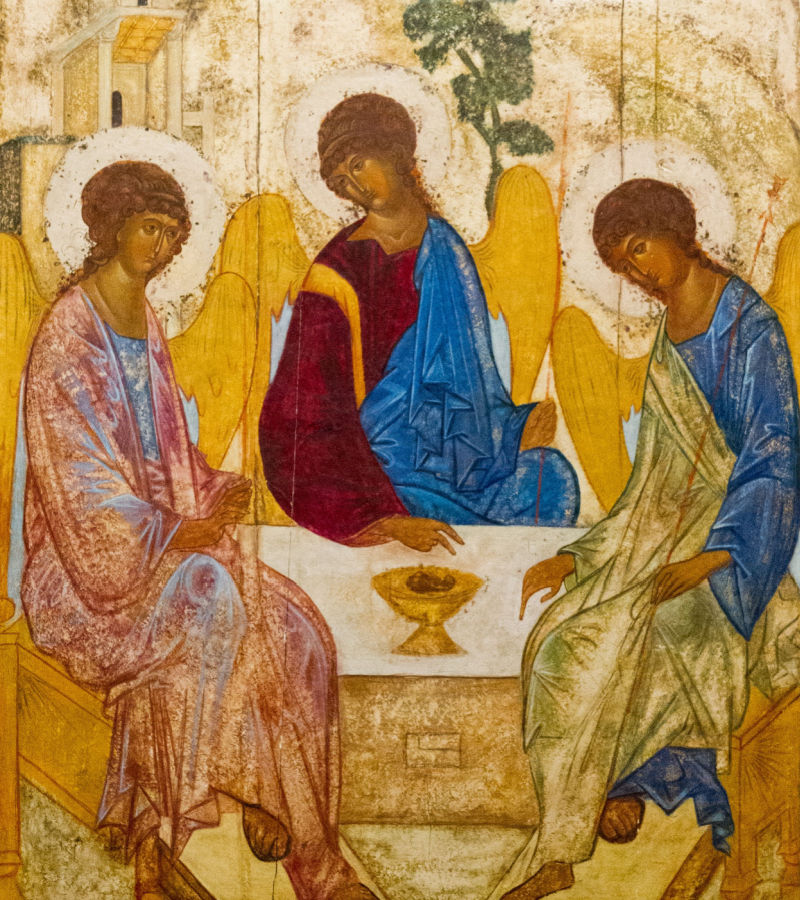Prayer is a journey of our heart and mind to find our way to the table of God.
Of everything that Jesus had to say on the subject of prayer, there are perhaps no more famous or confusing words than the three simple verbs—ask, seek, and knock—he uses in the Sermon on the Mount in Matthew 7. On the one hand, they issue an empowering and straightforward invitation, and on the other hand, this invitation doesn’t deliver consistent, predictable results. Was this false advertising? Did Jesus overpromise? Or is His original meaning lost in translation across centuries, traditions, and translations?
In these three verbs, Jesus is naming the trail markers on the common prayer journey, a path tread by men and women of faith stretching all the way back to the beginning.
Prayer is a journey that starts with need and ends in relationship. When we are born into this world, our first words are unintelligible cries of pain and need. Babies weep and wail before they learn coherent speech, before they learn relational trust in the mother and father who brought them into this world. Likewise, prayer is primal language, instinctively emerging from us in the face of pain and suffering. Need first drives us to our knees, but relationship keeps us there.
That’s what Jesus was getting at—the deeper invitation hidden in three simple verbs—ask, seek, and knock.
ASK refers to the requests that bring us to prayer. Most prayers are preceded by need—a diagnosis, a car accident, yet another negative pregnancy test, a holiday with the absence of a loved one, another week without a call back on a single application, a credit card bill that keeps climbing, a breakup, a divorce.
Life has a way of dealing us a card or two we never saw coming and don’t know how to make sense of. We are happily humming along, content with our fragile, elusive sense of control over our lives when all of a sudden we are gut-punched, mugged in broad daylight, and robbed of the life we thought was so securely “ours.” When we find ourselves in a story we don’t recognize, with no way back to the plot we thought we were living, we pray. We “ask.”
SEEK is a word peppered throughout Scripture that often refers to God himself. We are instructed to seek God through the stories of kings and judges, the poetry of the psalms, and the cries of the prophets. By using the word seek, Jesus pointed the way along the path of prayer: we come asking and discover relationship amid the mess. We come seeking gifts, and we often get them! But the greatest gift, the One we’re really after and the One we’re guaranteed to receive, is the Giver himself.
KNOCK, Jesus’ final verb in this teaching on prayer in the Sermon on the Mount, is the destination of the prayer journey that begins in need. Biblically speaking, knock prompts the imagery of table fellowship.
This is a provocative image in today’s world of fast food, power lunches, and takeout dinners, but it was all the more provocative in the ancient Hebrew world, where acceptance, dignity, and equality were given by table fellowship. To dine with someone back then was not merely to tolerate their company while getting some much-needed nourishment. To share a table was the greatest affirmation of their character and the truest and deepest form of intimacy.
Jesus was criticized, on multiple occasions, for breaking bread with tax collectors, prostitutes, and notorious sinners for this very reason. It was one thing for a rabbi to be seen in conversation with such a person on the street, but to share a table with them? That was unthinkable.
The greatest illustration of prayer Jesus gave is the one He lived—the Infinite Other, the Alpha and Omega, the Holy and Infallible, welcomes us to His table. He does not simply tolerate our company or benevolently entertain our requests; he affirms our person, chooses our company, and delights in our presence.
“Prayer enlarges the heart until it is capable of containing God’s gift of himself. Ask and seek, and your heart will grow big enough to receive him and keep him as your own,” writes Mother Teresa.[i]
We come for gifts, and we get the Giver. And we find ourselves seated at His table, welcomed, accepted, and loved, being fed, being listened to, relaxing in the warm presence of the loving God.
One of the most famous icons in church history, traced back to Russian painter Andrei Rublev in the fifteenth century, is commonly referred to as The Trinity.

Casorate Primo Italy October 26 2017 Stock Photo 758348311 | Shutterstock
It has stood the test of time because it so vividly captures the divine in a common scene—Father, Son, and Holy Spirit seated at a table, enjoying each other’s company. Here we have a communal God engaged in a conversation that moves effortlessly from small talk to depth.
Prayer—in any form, by anybody—is God’s invitation to pull up a chair to the table and enjoy restful, intimate, unbroken conversation with the triune God. Or as Jesus succinctly said it, “Knock and the door will be opened to you.”[ii]
[i] Mother Teresa, A Gift for God: Prayers and Meditations (San Francisco: HarperSanFrancisco, 1996), 75.
[ii] Matthew 7:7.
Taken from Praying Like Monks, Living Likes Fools by Tyler Staton. Copyright © (October 2022) by Zondervan. Used by permission of Zondervan, www.zondervan.com.
Author Info
Tyler Stanton
Tyler Staton is the Lead Pastor of Bridgetown Church in Portland, OR, and the National Director of 24-7 Prayer USA. He is passionate about pursuing prayer in the honest realities of day-to-day life. Tyler is also the author of Praying Like Monks, Living Like Fools: An Invitation to the Wonder and Mystery of Prayer and Searching for Enough: The High Wire Walk Between Doubt and Faith. He lives in Portland with his wife Kirsten and their three sons.